At Ahrefs, we read and share articles all the time for marketing and SEO inspiration.
In fact, SQ puts a call-out for the best SEO blogs every week, to curate the Ahrefs’ Digest.
Below you’ll find our favorites–the blogs that have made it into our Chrome bookmarks, LinkedIn Saved folders, and Slack conversations–some so good we’ve slid into the authors’ DMs just to tell them so.
The list won’t contain your usual suspects. Think of it as a directory of the best new SEO blogs; the underdogs and the experts that deserve way more recognition!
Here they are, in no particular order…
The blog: Metehan.ai
Run by: Metehan Yeşilyurt, Co-Founder of AEO Vision
Best for: Cutting-edge, hands-on AI assistant research
Our favorite article this year: I Found It in the Code, Science Proved It in the Lab: The Recency Bias That’s Reshaping AI Search
Metehan has become a household name in SEO almost overnight thanks to his ChatGPT detective work.
He is most well known for mining ChatGPT’s source code to decipher actual configuration parameters, and help SEOs reverse-engineer AI visibility.
I love how transparent Metehan is about his research process—it could almost be a “Decode ChatGPT with me” follow-along.
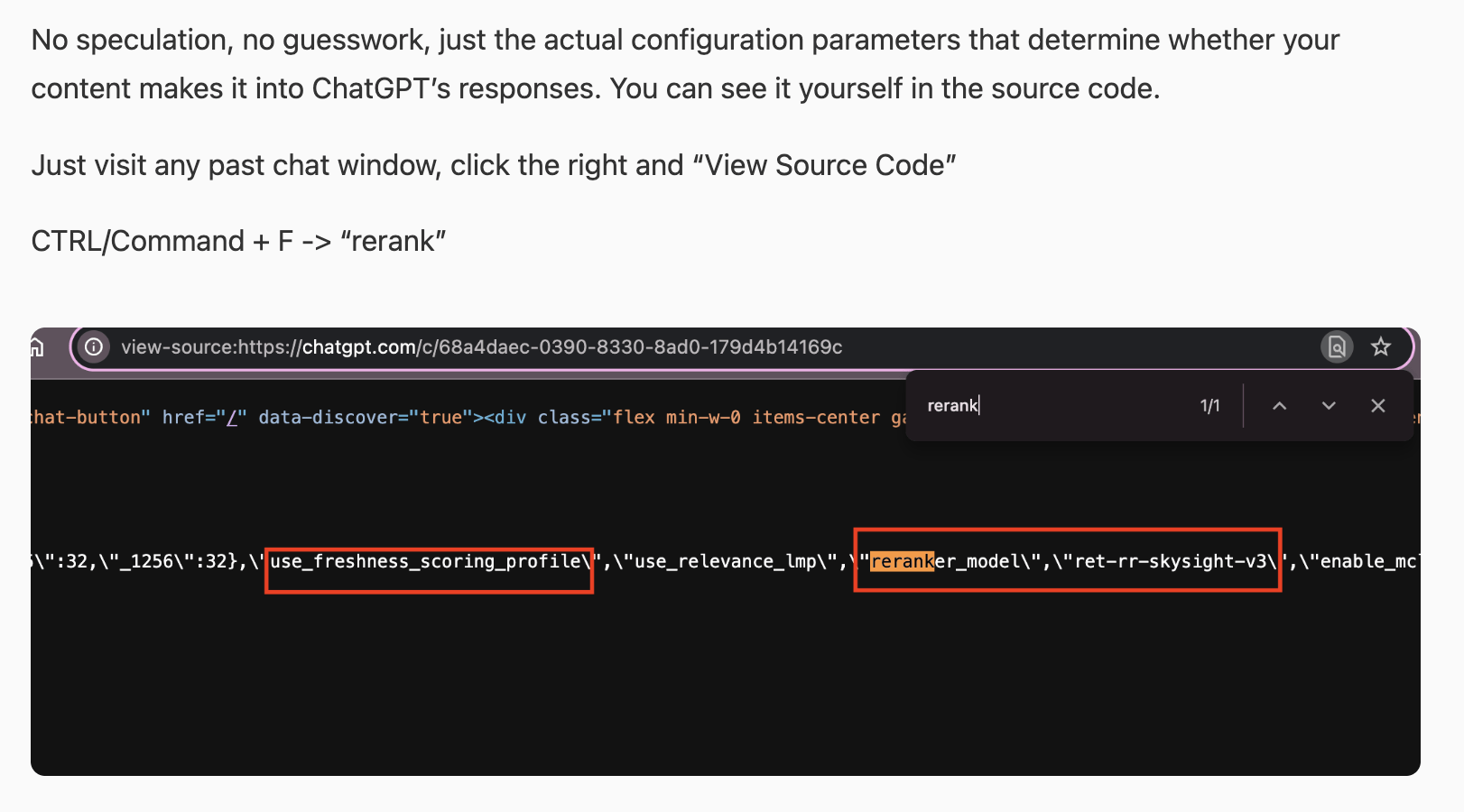
Even better, he spells things out clearly so they’re quick to read, and easy to grasp.
So far, he has already discovered that AI assistants:
- Run content through three layers of re-ranking—post search engine retrieval
- Lean heavily on a shortlist of already-trusted domains
- Consistently surface new or recently updated posts over older ones

The blog: Analytics Playbook
Run by: Dana DiTomaso, founder of Analytics Playbook and President of Kick Point Inc.
Best for: Pro analytics advice backed by first-hand experience, and developing analytics news
Our favorite article this year: When a New Browser Launches: What I’m Seeing in Google Analytics for ChatGPT’s Atlas
Dana is always quick to roll up her sleeves and test the use cases her clients care about—from analyzing AI traffic behavior, to identifying referral traffic from ChatGPT’s new Atlas browser in GA4.
Every article contains tons of real client anecdotes and examples—nice proof that Dana and the Analytics Playbook team have skin-in-the-game.
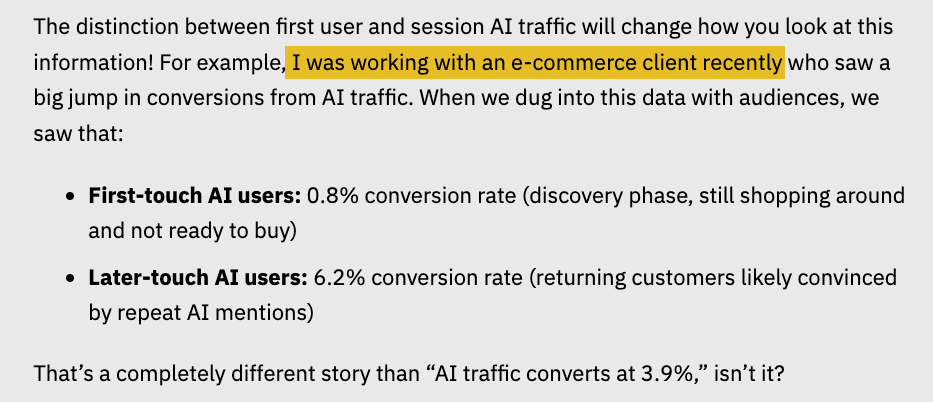
I love that you can also watch the blog if you’re a visual learner…
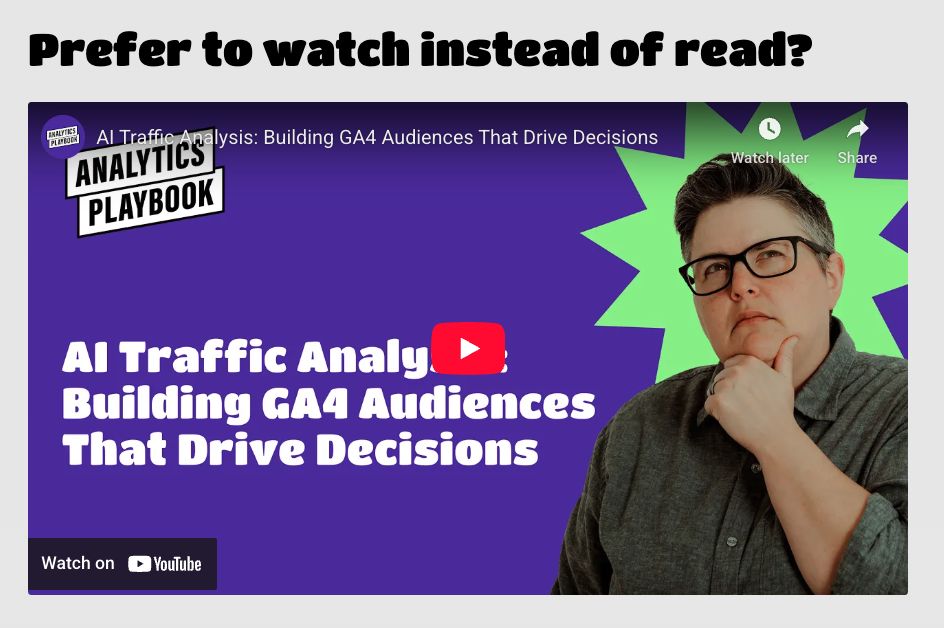
Read it for detailed advice, easter egg tips, and very specific analytics intel.
The blog: Detailed
Run by: Glen Allsopp, founder of Detailed, the Detailed SEO Extension, the SEO Blueprint, and now Head of Marketing Strategy & Research at Ahrefs
Best for: SEO insights from tracking the rankings & revenue of 3,078 Digital Goliaths
Our favorite article this year: Detailed Q4: Analysing The SEO Playbook of Digital Goliaths In-Depth, Every Quarter
Glen is best known for his forensic analysis of “Digital Goliaths”—how they operate, what they’re doing in SEO, and what smaller players can learn from them.
You may know him from his awesome study on how just 16 companies are behind 500+ websites that dominate Google’s search results. That one went seriously viral!
What’s great about Glen is his attention to detail (no pun intended)—he publishes maybe 10-25 posts per year max, spending weeks on each one rather than churning out weekly content.
And the content is meaty. Expect 10,000+ word reports with data analysis, screenshots, and specific tactical insights you won’t find elsewhere.
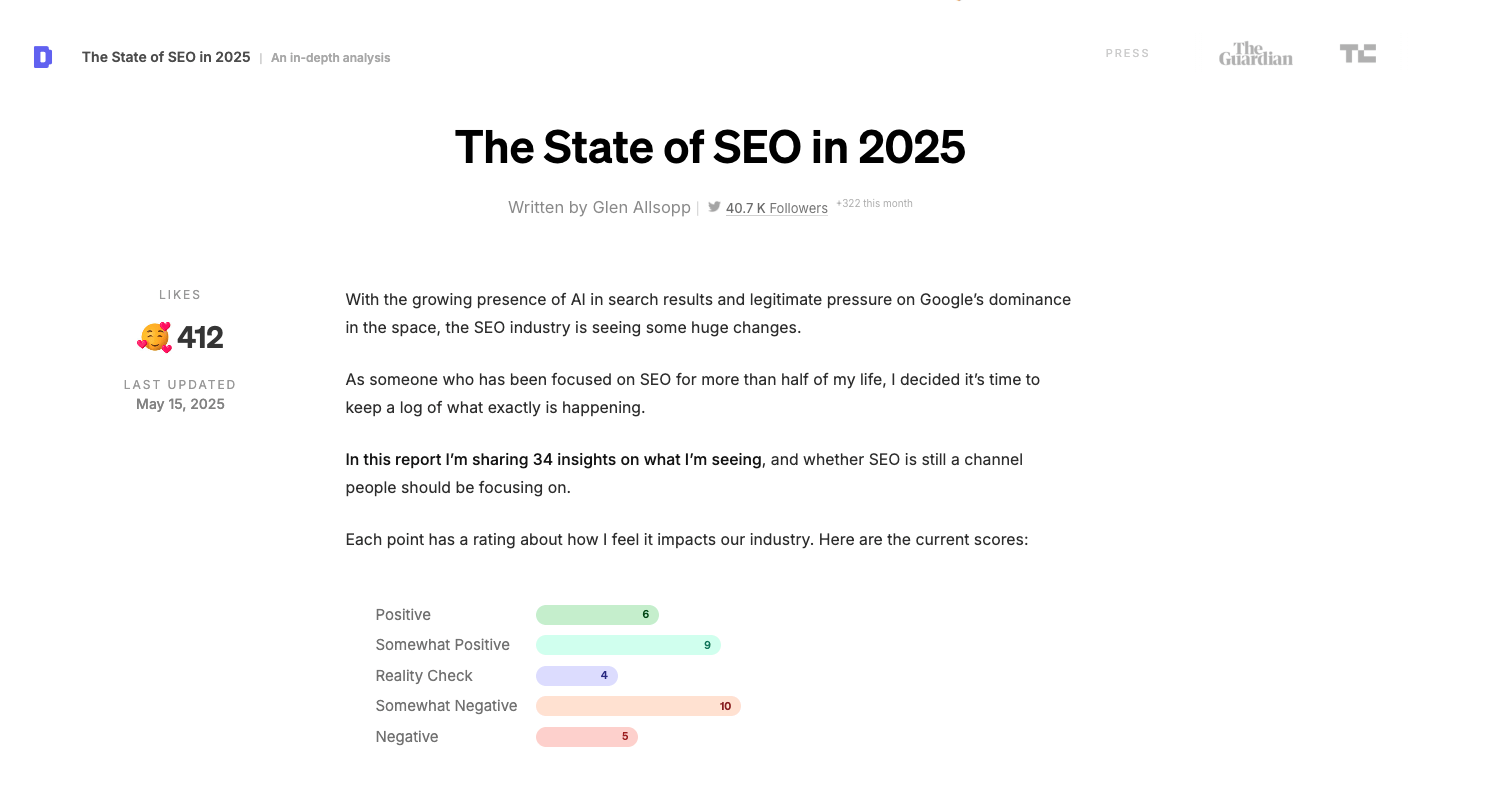
Glen is also a great reporter, committed to trying to find new information.
For instance, he attends live earnings calls of major companies and transcribes them, giving readers intel on what the top movers and shakers are prioritizing when it comes to SEO.
So far this year, Detailed has taught us that:
- Independent site owners land just ~14% of first-place search rankings
- Digital Goliaths still own ~80% of top search results across large-industries
- Yet, only 18% of major-brand sites grew YoY in April 2025
Bottom line: If you want to understand how the big players dominate search and what tactics you can steal for your own site, it’s essential reading.
In fact, we were so convinced that Detailed was the best SEO blog out there, we acquired it!
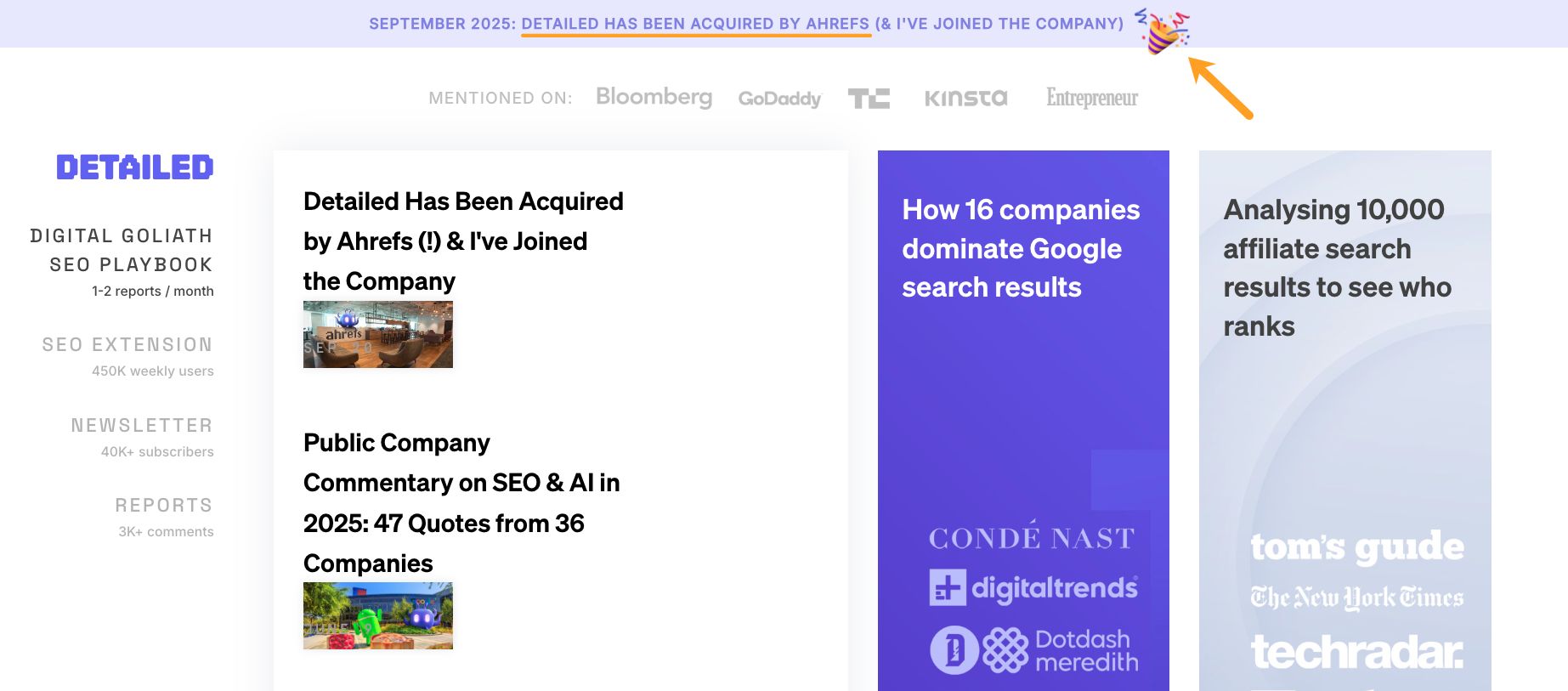
Now Glen is a fully-fledged member of the Ahrefs team and we couldn’t be happier about it!
The blog: Growth Memo
Run by: Kevin Indig, founder of Growth Memo and Growth Advisor
Best for: Pioneering SEO and AI search studies
Our favorite article this year: What content works well in LLMs?
Growth Memo is Kevin Indig’s weekly SEO newsletter that he also publishes as a blog.
If you’re after rigorous, original research into query fan-outs, AI Mode usability, and LLM traffic, this is the one for you.
As you can see, we love Growth Memo at Ahrefs HQ…
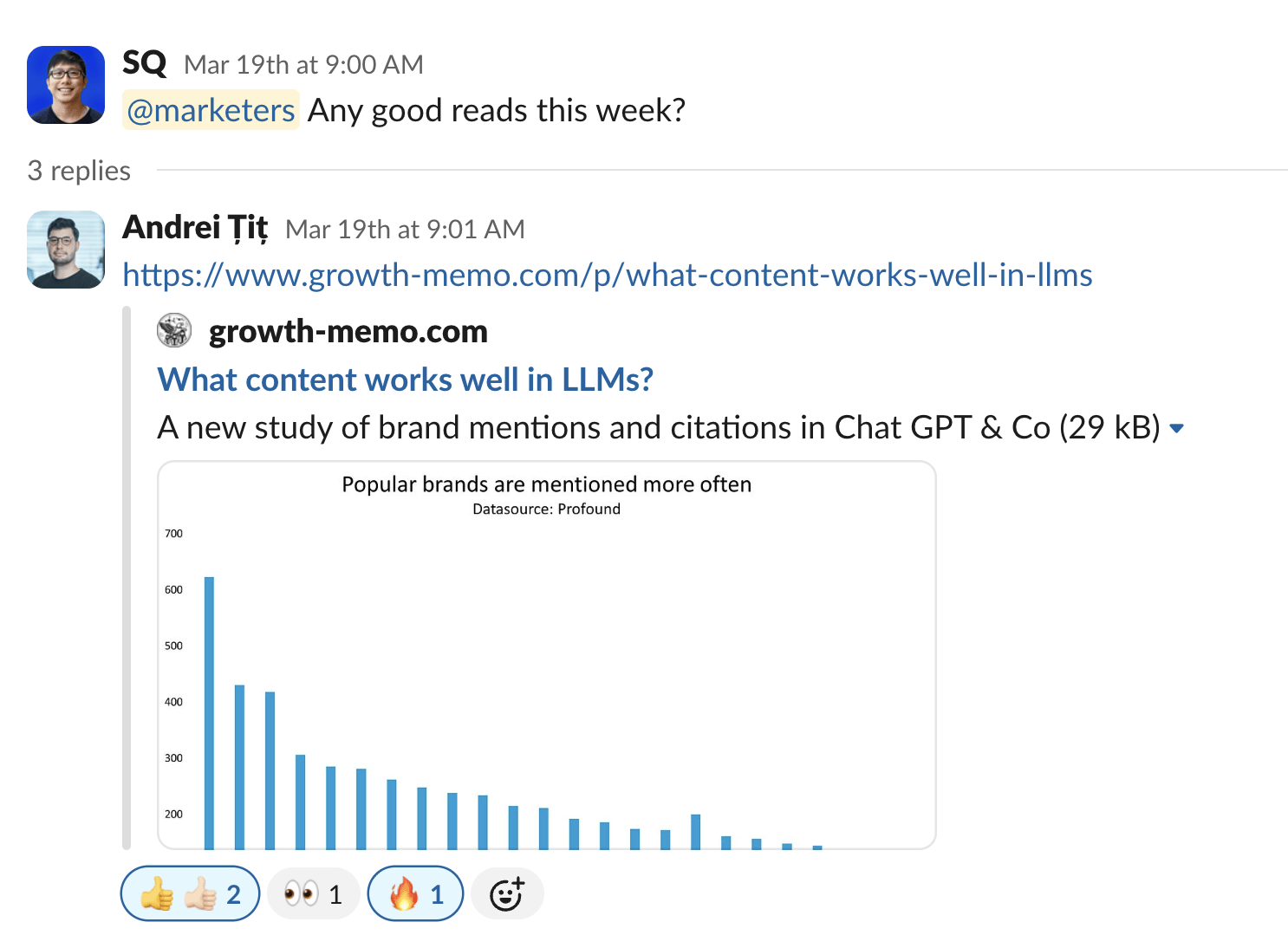
In fact, Kevin’s findings often inspire us to create new research of our own.
For instance, his awesome study “What content works well in LLMs?” made me want to look into the correlations between popular search factors and brand visibility in AI Overviews.

In 2025, Growth Memo has taught us that:
- The word “best” is a strong trigger for brand mentions in 69.71% of prompts across ChatGPT, Perplexity, and AI Overviews
- LLM referral traffic in B2B grew +65.1% since January—but dropped -42.6% since July
- Most users only skim the top third of an AI Overview panel
The blog: Not a Robot
Run by: Jamie Indigo, Head of SEO at Cox Automotive, Senior Technical SEO at Lumar, Author of Traffic Think Tank SEO newsletter: Rich Snippets, Technical SEO Consultant and Founder of Not a Robot
Best for: Satirical, bite-sized blogs on AI and web transparency
Our favorite article this year: Atlas Shrugged, the web flinched
Inspired by Tim Berners-Lee’s principle that “the web only works if it works for everyone,” Jamie Indigo uses her blog to champion web transparency during the “AI gold rush”.
It’s a fun, snarky, bite-sized read, where Indigo demystifies search algorithms, prompt leaks, and AI software releases—breaking down what they actually mean for users and SEOs.
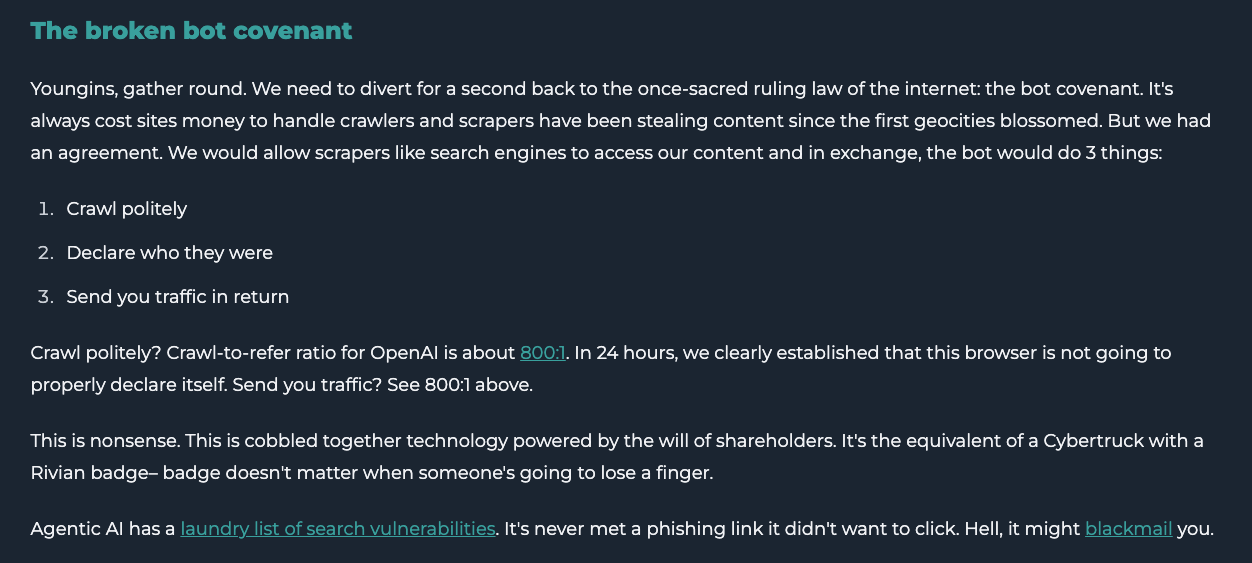
If you care about AI transparency and web ethics, give the “Not a Robot” blog a bookmark.
The archive is modest right now, but it looks like Jamie’s back to posting regularly!
The blog: Lars Lofgren’s blog
Run by: Lars Lofgren, Fractional VP of Content
Best for: Investigations and exposés into tech industry misfires—told through Lars’ signature dry, no-BS style.
Our favorite article this year: The Story of Codesmith: How a Competitor Crippled a $23.5M Bootcamp By Becoming a Reddit Moderator
Lars Lofgren is up there with some of the best investigative SEOs we have.
He doesn’t post excessively, but when he does, the stories tend to make a huge splash in the industry (Forbes’ parasite SEO marketplace anyone?)
It’s clear to see the hours of sleuthing that goes into every article—each one feels like it could be its own Netflix documentary.
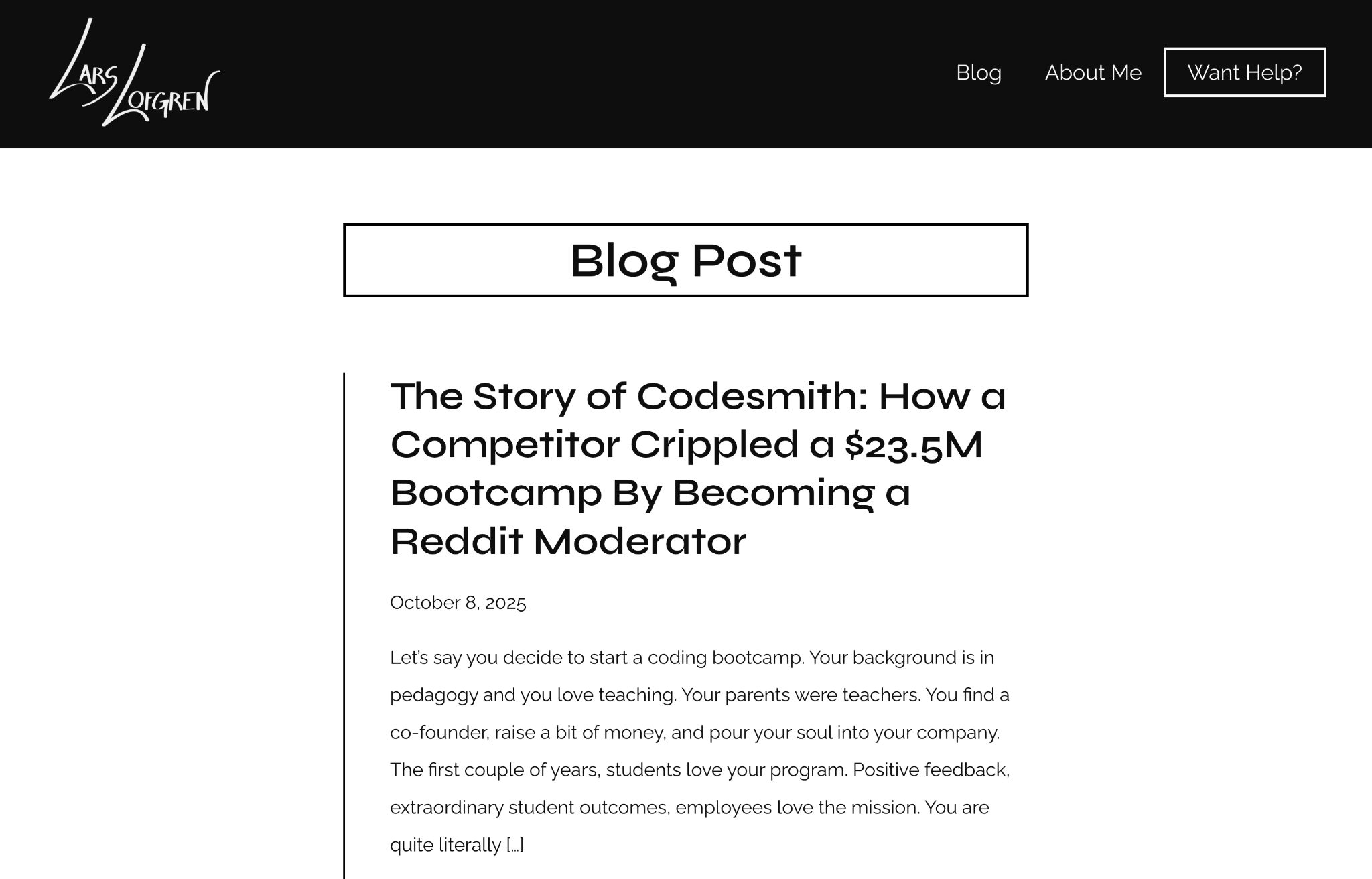
The latest–the tale of Codesmith–warns of the very real problem of competitor smear campaigns; made all the more potent by AI.
It’s insatiably readable. Bookmark Lars’ blog, and grab your popcorn!
The blog: I Love SEO
Run by: Gianluca Fiorelli, Strategic and International SEO Consultant at I Love SEO
Best for: Clear, strategic breakdowns of SEO and AI search.
Our favorite article this year: A guide to Semantics or how to be visible both in Search and LLMs
I Love SEO is the blog of seasoned international SEO consultant, Gianluca Fiorelli.
It’s one of the best SEO blogs for thoughtful commentary on how search is evolving—especially around AI, LLMs, entities, semantic search, and international strategy.
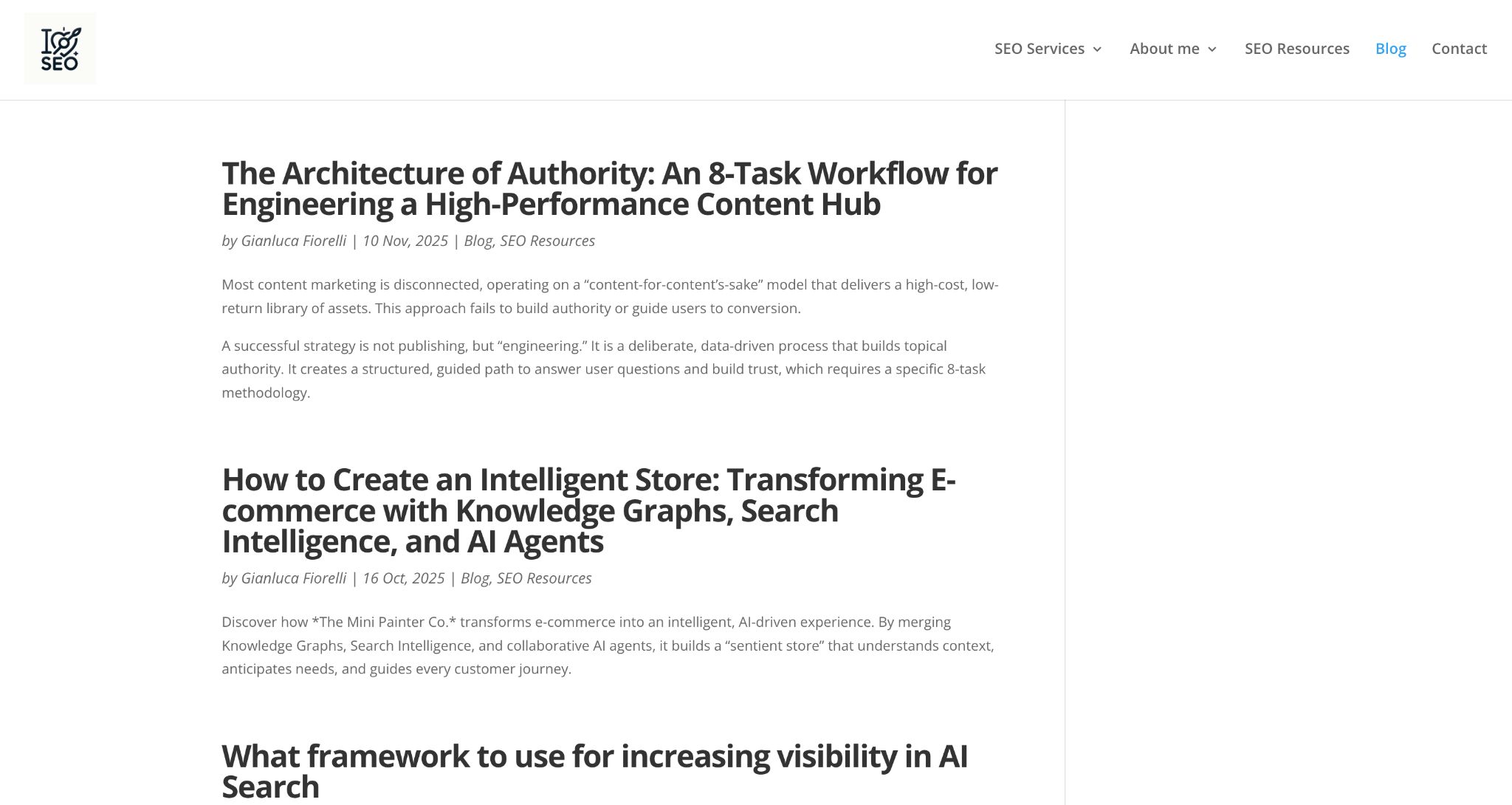
From reading, you’ll learn that:
- Brands need to build out their entity graphs–including who they are, what they do, products, people, and topics–since AI assistants rely heavily on entity relationships vs. keyword matching
- The “classic funnel” (query → click → site → convert) has been replaced by something like: Query → AI Overview → Synthesised Answer → (Maybe) Brand Mention → (Maybe) Branded Search
- You need to make your content fragmentable and remixable if you want it to show up in AI systems
We’re big fans here!

The blog: Seer Interactive blog
Run by: The Seer Interactive team, including Wil Reynolds and Christina Blake
Best for: AI search tests, studies, and receipts for actually “doing the thing”
Our favorite article this year: AI Optimization Test: Footers are back like 2003
Wil Reynolds, Christina Blake, Alisa Scharf, and the rest of the Seer Interactive team have built a seriously enviable library of search how-tos, scrappy test-and-learn studies, and whip-smart AI research.
Wil? He’s casually built an AI agent that phones up and interviews subject matter experts, to speed up the creation of E-E-A-T rich, AI-assisted content. Christina has tested a bunch of interesting things, including the overlap between Bing search results and ChatGPT citations. Alisa has created the “SWIM” framework—something you can actually do while everyone else is screaming into the void about AI.
And this is only the tip of the iceberg. Needless to say, we are fans here at Ahrefs…

The blog: Marketer Milk blog
Run by: Omid G, Founder at Marketer Milk
Best for: Honest tool reviews, inspiring marketing examples, and sharp SEO takes.
Our favorite article this year: 8 top SEO trends I’m seeing in 2026
Marketer Milk is the weekly marketing blog and newsletter of Omid Ghiam—a marketer, writer and no-code enthusiast who previously led SEO and content at Webflow.
I had the pleasure of meeting Omid at Ahrefs Evolve, and he let me in on a solid tip (which I have since spied on Marketer Milk): if you want to improve your chances of ranking, and therefore being cited in LLMs, create and embed a video version of your blog (just like Dana DiTomaso does in the Analytics Playbook).
It’s great for UX, building E-E-A-T, and helps you lay claim to more SERP real estate.
That may be the reason why Marketer Milk is ranking #1–#3 in every other marketing and SEO SERP I come across right now!
That, and the fact that the blog is clear, sharp and full of tangible takeaways. I especially enjoyed Omid’s top 2026 SEO trends, which was, in part, inspired by Ahrefs Evolve!
Omid is probably best known for his candid reviews of SaaS products. What I really respect is that he doesn’t accept sponsorships, and writes reviews only to serve the reader—a rare breed these days.

Bookmark this blog for authentic tool recommendations and insider SEO knowledge from someone with on-the-ground experience.
The blog: Content Caffeine
Run by: Nicole DeLeon, Founder at North Star Inbound
Best for: SERP changes, PR insights, and curated news
Our favorite article this year: Do-it-yourself SEO, not all clicks are equal, and will title links return?
If you’ve got to this point in the blog, you’ve probably noticed a theme developing.
Many of the SEOs on this list don’t just talk the talk—they actually do the thing.
That’s why I love Content Caffeine. Nicole DeLeon often shares snippets of SERP tests she’s tried out and backs up all of her original opinions with actual receipts—see the *Noticed in the wild* section below.

In her latest blog, Nicole put forward the idea that long-tail, nuanced topics are less likely to experience CTR decline.
She illustrated this with an example of her own super long-tail query in the SERP, that was met with a 7K+ article—not an AI Overview.
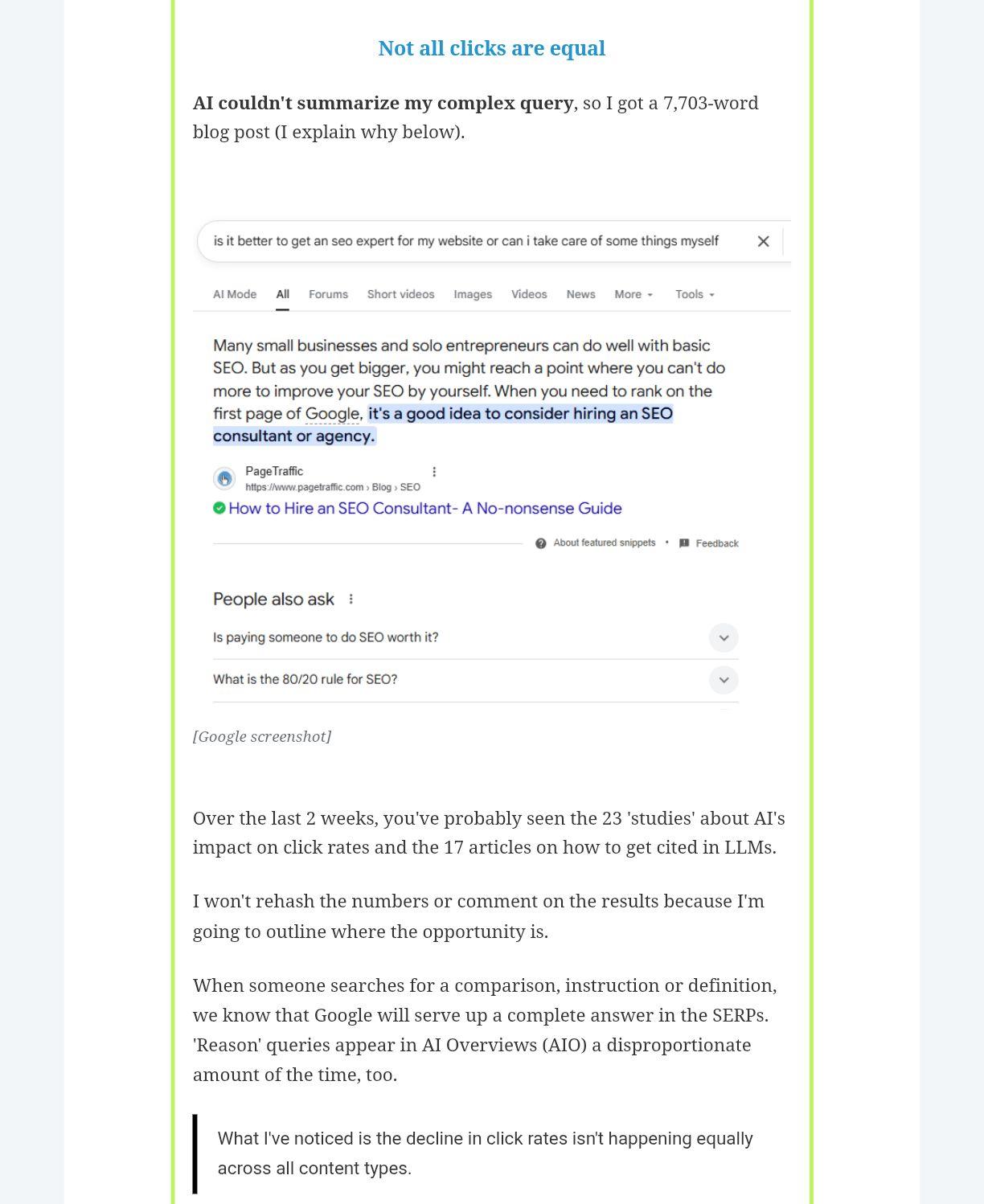
I think this makes total sense, and aligns with a theory I had when I first set out to study AI proof keywords.
Have a read of Content Caffeine for these kinds of twice-monthly SEO and PR insights—plus top curated news.
The blog: Nectiv blog
Run by: Chris Long, co-founder at Nectiv
Best for: Replicable SEO tutorials and the latest AI tests and studies
Our favorite article this year: New Data Study: What Queries Is ChatGPT Using Behind The Scenes?
Chris Long has become one of the SEOs I always look out for on LinkedIn.
His no-fluff summaries of cool AI search studies means he crops up regularly in my “Saved” folder.
As well as curating awesome content, he also puts the reps in when it comes to doing the research.
Most recently, he’s published some great findings on fan-out queries.
For instance, after studying 8,500+ prompts, he found that ChatGPT performs a search 1 in 3 times to ground its training data.
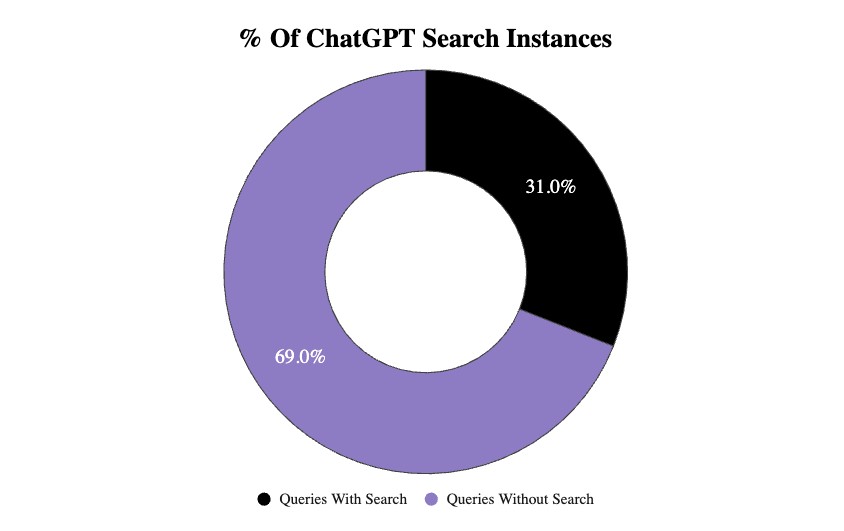
And that 77% of all fan-out queries are five words or longer…
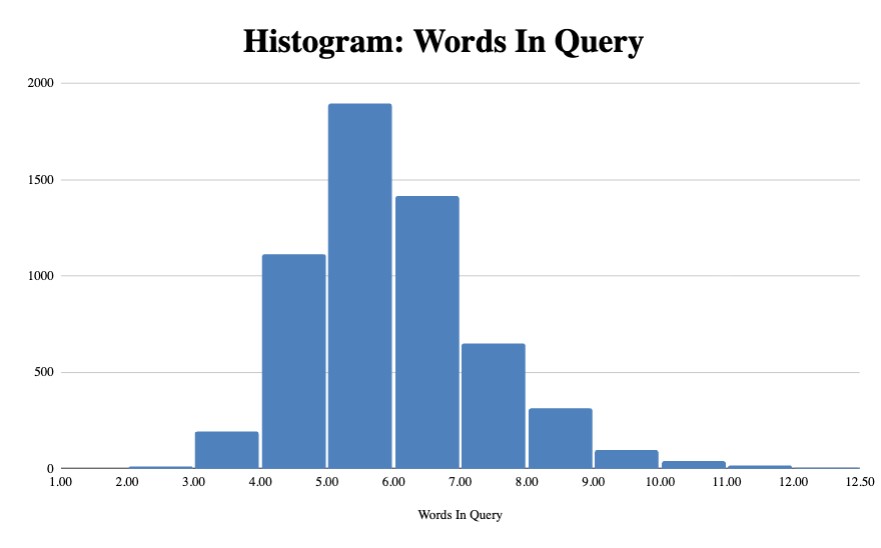
This is all crucial to know if you’re looking to reverse-engineer a way to show up in AI answers.
Chris also shares vlogs of himself testing out new tools and walking through practical use cases.
For instance, he recently used Ahrefs data and Claude to build out a topical map of semantically related keyword clusters.
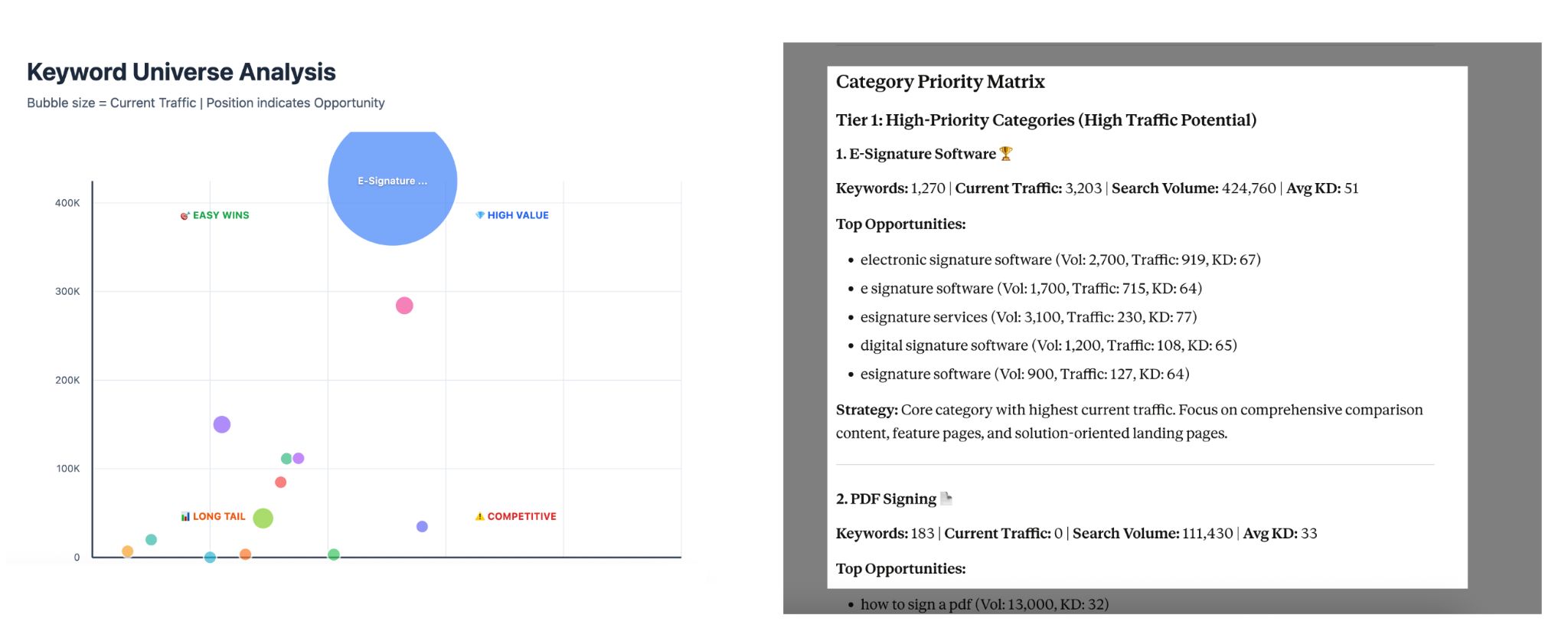
It’s well worth keeping an eye on his blog for updates.
The blog: Nikki Pilkington’s blog
Run by: Nikki Pilkington, SEO Consultant and SEO Content Specialist
Best for: Blunt yet smart search advice
Our favorite article this year: AI SEO “hacks” that will f**k up your traditional SEO
Nikki Pilkington wins the award for the best designed SEO blog—it’s punk meets SEO and I am here for it!
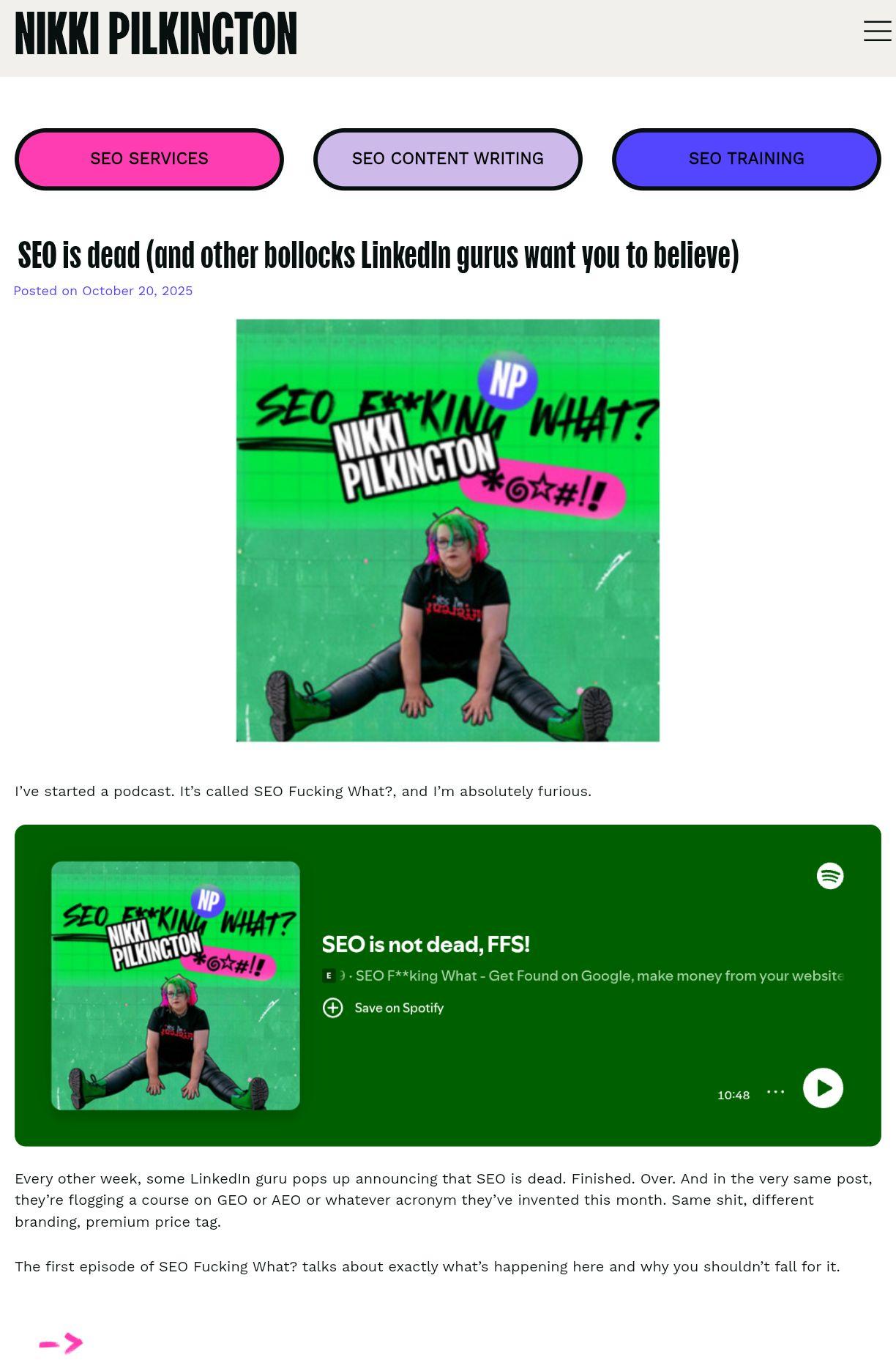
Self-described as “non-w**ky SEO”, and backed by an equally brilliantly named podcast series “SEO F**KING WHAT?”, Nikki’s blog is a funny account of an SEO who’s seen it all.
If you want dry, withering takes on the BS of the SEO community, backed up with solid advice and unfolding search news, this is the blog for you.
The blog: Jono Alderson’s blog
Run by: Jono Alderson Co-Founder of Days of the Year and SEO Consultant
Best for: Thought-provoking opinion pieces on the state of marketing and SEO
Our favorite article this year: If you want your blog to sell, stop selling
There’s something about Jono’s writing that just hits. He expertly puts a feeling or frustration you didn’t even realise you had into words.
A recurring theme in his blog is his refusal to accept the classic business excuse: “we’ve always done it that way.”
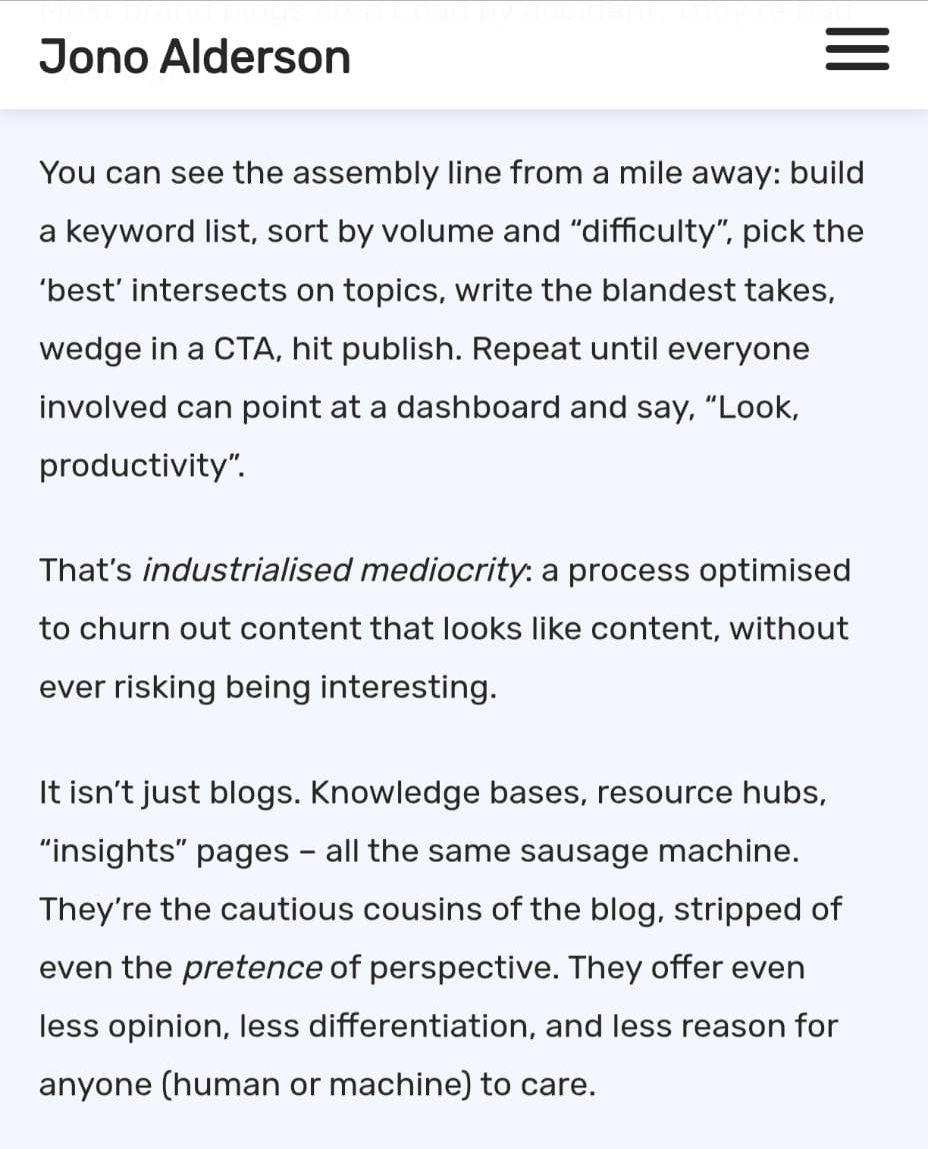
His posts will make you step back and rethink your approach to writing, marketing, and SEO.
And they’re so readable.
Every line lands cleanly, the language is engaging, and the pacing makes you want to read on and on.
In fact, I felt so inspired by Jono’s blogs, I had to reach out and let him know.
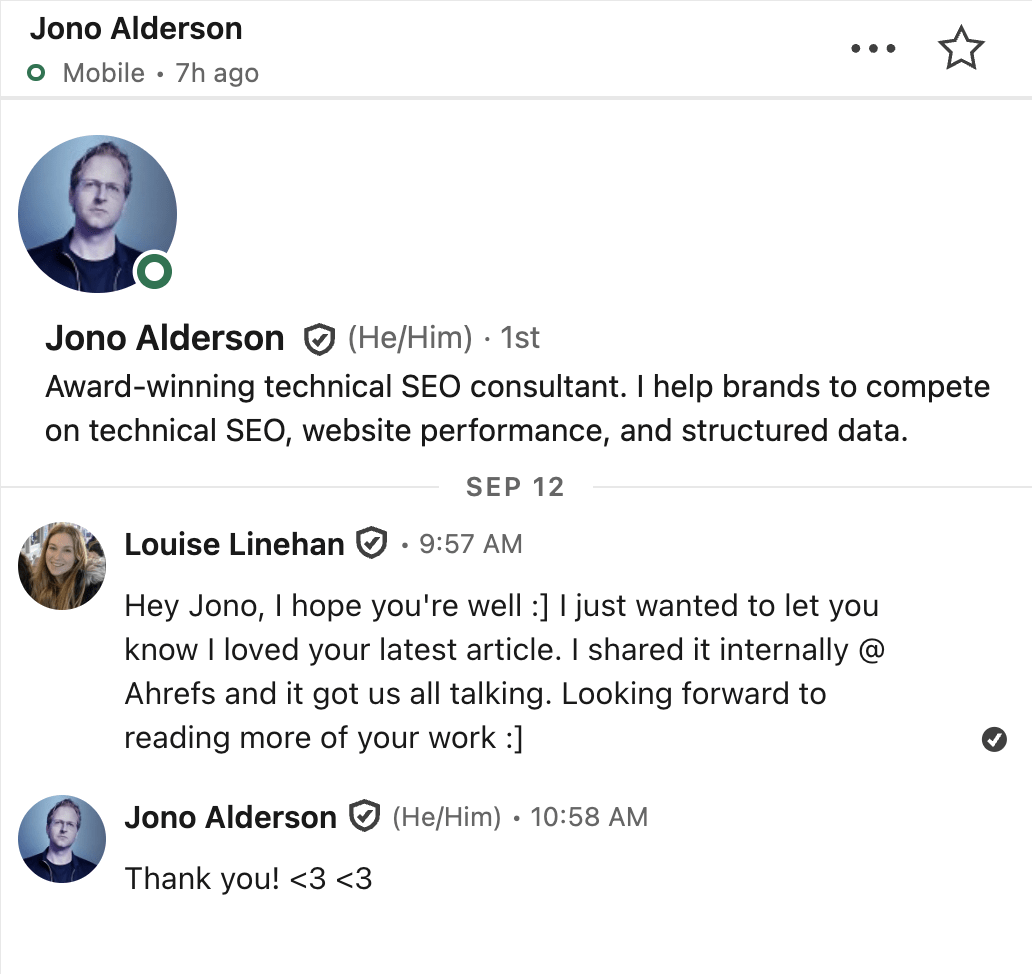
Jono’s content is far cry from the formulaic SEO blogs you sometimes see clogging up the SERPs. Definitely one to bookmark!

Wrapping up
If this list proves anything, it’s that the best SEO blogs are the ones backed by real curiosity and experience.
These are the underdogs, the experimenters, the people pushing search forward while everyone else debates the difference between SEO and GEO.
Read their blogs, follow them on LinkedIn, and set up RSS feeds to get notified whenever their new content drops.



